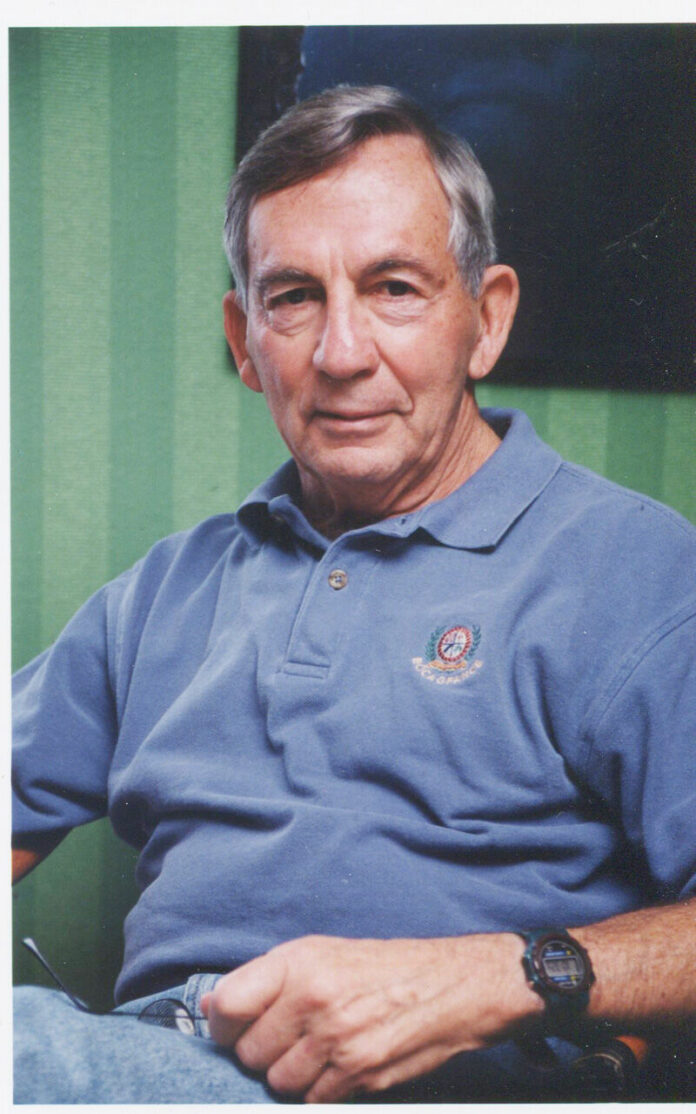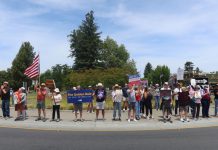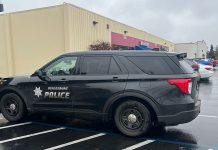He led numerous other civic causes, including the 1999 campaign to save Healdsburg District Hospital
Henry Hersch arrived in Healdsburg in 1997 and devoted the last three decades of his life to numerous civic causes and community-building endeavors. It is hard to imagine how many more cultural organizations, charities and community institutions Healdsburg might have today, if Hersch had only gotten here sooner.
The man who led the campaign to save Healdsburg’s hospital from closure, helped found the Healdsburg Education Foundation, revived the Boys & Girls club, wrote bylaws for the local arts center and jazz festival and mentored countless local community leaders and business owners, died May 20 after a lengthy illness. He would have turned 96 on June 1, his birthday.
Hersch brought his well-honed legal skills and lifelong passion for civic leadership to northern California following a lengthy and distinguished corporate law career in Cincinnati, Ohio. His new community of Healdsburg became double-blessed because his equally gifted and talented wife, Gloria came with him.
Following semi-retirements, the Herschs took annual vacations on the Mendocino coast and started looking for a permanent California location. “We wanted a jumping off place closer to the symphony and opera than Mendocino and started looking around Sonoma County,” said Gloria in a recent interview. “When we found Healdsburg, we didn’t know we had landed in paradise. Henry always believed that.”
In 1999, the corporate owners of Healdsburg General Hospital announced they were closing the hospital and a group of men began organizing efforts to keep it open. Among these were Max Dunn, director of the Alliance Medical Clinic, physician Dan Rose, and Rotarian and retired business executive Jack McCarley. After McCarley heard Hersch give a speech to his Rotary Club he knew who was needed to lead the Herculean effort to save the hospital and raise millions of dollars for its purchase by the community.
No single person deserves credit for saving the hospital, but it’s likely the campaign would have stalled or failed without Hersch’s leadership. “Henry is intensely devoted, extremely intelligent, incisively analytical, witty, wise, experienced, eloquent, honorable, forthright, energetic, dependable, inspirational and modest,” Dr. Rose said several years ago during ceremonies when Hersch was unanimously selected as a Director Emeritus of the Healdsburg Hospital Foundation, today’s Healthcare Foundation of Northern Sonoma County.
Dr. Steve Vargas met Hersch while serving on the hospital board together. “Henry was an extraordinary man and role model, especially in his concerns for the community and how he dedicated his final decades to that service,” said Vargas, who had weekly coffee conversations with Hersch over two decades. “He was one of the greatest friends of my life.”
Another longtime friend, artist Jerry Anderson remembers Hersch as both an older brother and a wise peer. “He was fearless and just totally straightforward in all things,” said Anderson. “He was just not afraid to open up about himself and share himself to others.” Anderson remembers how nervous Hersch was about a speech he was preparing for his 90th birthday party. “He was excellent as always.”
Hersch had accomplished equal civic contributions in Cincinnati, where he led efforts to improve mental health and family services, served on various community and education boards and once led a countywide bond effort to secure permanent funding for mental health services. That achievement led to his throwing out a first pitch at a Cincinnati Reds major league baseball game and seeing his beaming smile on the stadium’s huge Jumbotron screen.
In Sonoma County, Hersch also served on the boards of the Santa Rosa Symphony, Russian River Chamber Music, Healdsburg Education Foundation, KIDS of Sonoma County, KRCB public media corporation and others. At the same time, Gloria was applying her corporate organizational and consulting skills to help found the Healdsburg Center for the Arts and the Healdsburg Jazz Festival nonprofit board. The couple always found time for regular bridge games and global travels to partake in operas and classical music performances.
Hersch was born in the middle of the Great Depression (1925) in Parkersburg, West Virginia. His college career was delayed for several years while he fought in World War II, seeing two long years of frontline battles in northern France and Germany that ended at the Battle of the Bulge. Hersch slept countless nights in frigid foxholes and earned a Bronze Star, Combat Infantryman’s Badge and Good Conduct Medal.
In recollections he wrote a few years ago, Hersch discounted being part of the “Greatest Generation” and said he was just one of thousands of foot soldiers “who just did what I was ordered to do, sometimes filled with trepidation. There are no heroes in foxholes,” he wrote.
He did say his war experience opened his eyes to a wider world beyond his small-town upbringing. “I had no clue about racism (but) the war was also a segregated world. I find bigotry, in all forms, unacceptable. I found a respect for all mankind.”
After the war Hersch attended Princeton University and received a law degree from Yale University which led to his successful and high profile law career in Cincinnati where he eschewed politics in favor of more pure civic leadership roles.
Henry and Gloria were married in 1976, following previous marriages by both. The man who once received special seating at a restaurant for being mistaken as movie actor Ben Gazzara, was called “my knight on a white horse,” by his second wife, Gloria, who plans to continue to reside in Healdsburg in the couple’s house on the western flank of Fitch Mountain that overlooks Healdsburg.
As a young and handsome attorney, Hersch was a “man about town,” drove a convertible, gave tons of speeches at banquets and awards ceremonies and always caught the eye of admiring women, finally being caught by Gloria. He also made summer trout fishing trips to Bozeman, Montana and other travels to Florida, Mexico and elsewhere. “Henry did a lot of things and he always talked about how being a Depression era baby influenced him” said Gloria. Henry usually graduated at the top of his class, and was magna cum laude at Princeton and offered a Woodrow Wilson Fellowship which he declined in favor of law school. Hersch often shared his feelings and experiences of being a lifelong recovering alcoholic, remaining sober for the last half of his life.
Besides his wife, Hersch is survived by two sons, Fred, of New York City and Henry III, of Bloomfield, New Jersey; his stepdaughter, Abbe Fabe Cohen, of Santa Rosa; son Fred’s life partner Scott Morgan and two grandchildren, Max and Eva. His son Fred is an internationally known jazz pianist and composer.
A celebration of Henry’s life is being planned for the fall at the Paul Mahder Art Gallery in Healdsburg. In his last days in May, Hersch compiled a running list of invitees, filling out several legal pad pages by pencil. “Henry insisted we have a big party,” said Gloria. “He said he didn’t want an invitations-only affair.” The Herschs suggest memorial contributions may be made to the Healdsburg Unified School District, Memorial Hospice of Santa Rosa or a charity on one’s choice.









